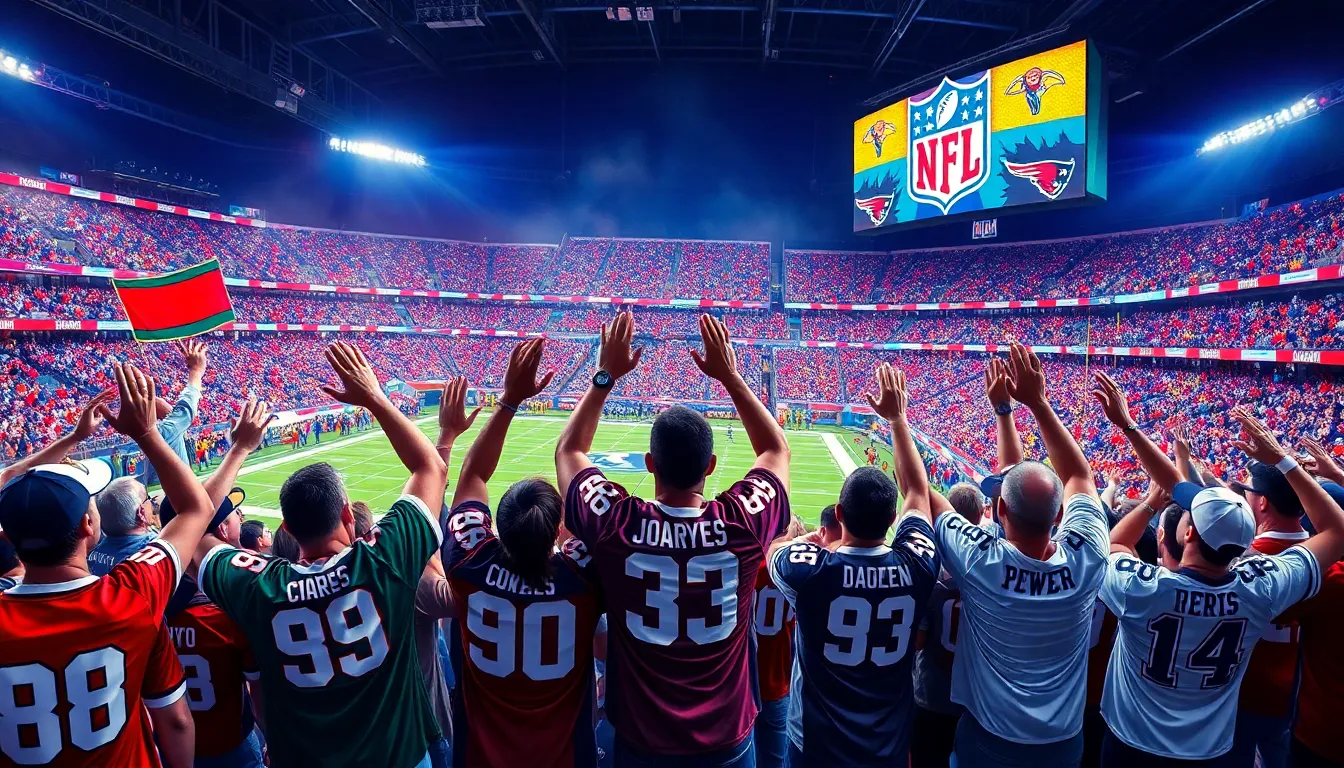As the leaves start to change and the air gets crisp, football fans everywhere know it’s that magical time of year again—NFL season is upon us! The thrill of game day, the roar of the crowd, and the smell of nachos wafting through the air make it hard to resist the excitement. But before diving headfirst into fantasy drafts and tailgate parties, knowing the NFL schedule is essential for every fan who wants to catch their favorite teams in action.
NFL Schedule
The NFL season unfolds with a 17-game schedule for each team, spanning from September to January. Weeks are organized into 18 distinct segments, accounting for one bye week for each team. Each team competes weekly, ensuring fans enjoy consistent action throughout the season.
Scheduling varies annually, though each team plays six divisional games. Divisional matchups typically occur twice per season, fostering intense rivalries. Non-divisional games add exposure, with teams facing opponents from other divisions based on their conference.
Primetime matchups attract significant viewership. The NFL schedules games on Thursday, Sunday, and Monday nights, showcasing marquee situations to maximize audience engagement. In addition, the NFL has special events like Thanksgiving Day games, featuring traditional matchups.
Flex scheduling during the final stretch of the regular season enhances competitive balance. This format allows the league to move games into more favorable time slots based on teams’ performances. It keeps the excitement fresh and ensures captivating matchups during crucial weeks.
Playoff scheduling follows a single-elimination format. The postseason typically begins in early January, culminating in the Super Bowl, which generally occurs on the first Sunday in February. This structure builds anticipation among fans, providing a thrilling conclusion to the season.
Understanding the NFL schedule is essential for any fan. Tracking the weekly games allows supporters to plan attendance, tune in for the latest action, and participate in fantasy leagues. The seasonal rhythm brings community, excitement, and connection, enhancing the overall football experience.
Key Features Of The NFL Schedule

The NFL schedule showcases exciting matchups and competitive balance throughout the season. Understanding the schedule allows fans to stay engaged and plan their football activities.
Regular Season Scheduling
Each NFL team plays a total of 17 games during the regular season, which runs from September to January. The schedule divides into 18 weeks, ensuring each team has a bye week. Divisional games take precedence, as each team competes in six rivalry matchups. Non-divisional games contribute variety to the experience, allowing fans to watch teams from different conferences. Primetime games occur on Thursday, Sunday, and Monday nights, attracting larger audiences. Special occasions like Thanksgiving games further heighten interest, creating memorable experiences for fans.
Playoff Structure
Following the regular season, the playoffs commence with a single-elimination format. Six teams from each conference qualify, including four division champions and two wild card teams. Each matchup intensifies as teams aim for the Super Bowl. Home field advantage plays a critical role for the higher-seeded teams, impacting fan attendance and engagement. This structure heightens the stakes, ensuring that each game matters significantly in the pursuit of glory, building anticipation for the championship event.
Impact Of The NFL Schedule On Teams
The NFL schedule significantly influences team performance and strategy throughout the season. Each team’s matchups and timing can alter their chances of success.
Strategic Implications
Teams analyze the schedule to maximize their performance. Early season games can set the tone for momentum, while late-season matchups often affect playoff qualifications. Teams prioritize divisional games, as these determine standings within the division. Additionally, primetime games impact a team’s visibility and recruitment efforts. Coaches develop strategies tailored to opponent strengths and weaknesses based on the scheduled matchups. The bye week serves as a critical period for recovery and game preparation, while flex scheduling ensures that competitive balance remains intact during the final weeks.
Travel Considerations
Travel logistics present challenges for teams throughout the season. Different time zones can affect player performance, especially when facing long distances. Teams’ travel schedules must consider potential fatigue and recovery time. Back-to-back away games can increase travel strain, impacting overall performance. Moreover, schedules that favor home games provide a significant advantage, enhancing player morale and fan engagement. Adjusting travel plans is crucial for maintaining focus and energy during crucial divisional games. Teams frequently analyze travel routes to minimize disruptions and optimize performance on game day.
Fan Engagement With The NFL Schedule
Game day generates excitement as fans gather in stadiums or connect through screens. The atmosphere buzzes with energy, marked by cheers, chants, and excitement. Tailgating creates a festive pre-game environment, where fans socialize and prepare for the match. This communal spirit enhances fan loyalty and attachment to teams. Engaging with the NFL schedule helps fans make plans around game days, ensuring optimal attendance and participation. Key matchups draw large crowds, particularly rival games that heighten anticipation.
Ticket sales fluctuate based on the NFL schedule’s design. High-demand games, such as divisional bouts or primetime matchups, experience increased sales. Directly correlating to the hype, these tickets often sell out quickly. Pricing strategies adapt to demand, with dynamic pricing reflecting fan interest. Special events like Thanksgiving games attract significant buyer interest, influencing secondary market prices. Seasonal trends also impact sales, as playoff potential drives fans to purchase tickets earlier. Engaging with the schedule fosters awareness, allowing fans to secure their spots for in-demand games.
Future Trends In NFL Scheduling
Innovations in NFL scheduling are rapidly evolving, focusing on enhancing viewer engagement and maximizing teams’ competitive edge. Flex scheduling remains crucial, adapting matchups to maintain excitement in the last weeks of the regular season. This method ensures that compelling games capture audience attention, particularly for teams vying for playoff spots.
Data analytics play a significant role in shaping future schedules. Teams increasingly utilize analytics to assess travel logistics, optimize bye weeks, and analyze opponent strategies. Understanding these variables allows organizations to better prepare their players and improve overall performance throughout the season.
Another trend involves expanding the NFL’s global reach with international games. Scheduled matchups across different time zones offer fans worldwide access to live action. Thus, this strategy strengthens fan loyalty while introducing new audiences to the excitement of American football.
Increased usage of prime-time slots reflects networks’ recognition of viewer habits. High-stakes matchups receive prime time treatment to attract larger audiences, thereby maximizing advertising revenue. Weekly ratings illustrate that fans are drawn to significant games featuring high-profile teams and star players.
Furthermore, the incorporation of technology has reshaped fan experience. Mobile apps now provide real-time updates and interactive features that enhance engagement during games. With fans such as season ticket holders benefitting from tailored experiences, teams are investing in creating memorable game day atmospheres.
Overall, these emerging trends pave the way for an exciting future in NFL scheduling. The league’s ability to adapt enhances fan experiences and maintains the thrill of the game. Changes in scheduling not only elevate viewing practices but also strengthen the connection between teams and their supporters.
Conclusion
The NFL schedule is more than just a series of dates; it’s a roadmap to excitement and community engagement. Fans eagerly anticipate each game as they gather with friends and family to support their teams. With the structure of the season promoting intense rivalries and strategic matchups, every game holds significance.
As the league continues to innovate with scheduling and fan engagement strategies, the future looks bright for both teams and supporters. Embracing the schedule allows fans to fully immerse themselves in the thrilling journey toward the Super Bowl. Whether attending games in person or enjoying them from home, the NFL season promises unforgettable moments that resonate throughout the autumn months.

